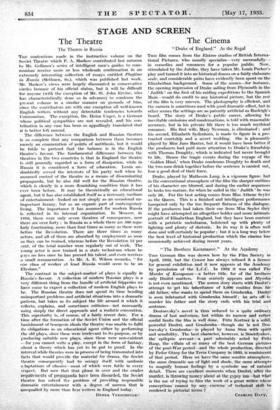STAGE AND SCREEN
The Theatre in Russia
THE contentions made in the instructive volume on the Soviet Theatre which P. A. Markey contributed last autumn to Mr. Gollancz's series of intelligent men's guides to com- munism receive more or less wholesale confirmation in an extremely interesting collection of essays entitled Playtime in Russia (Methuen, 6s.), which was published last week.
• Mr. Markov's views were largely discounted in conservative circles because of his official status, but it . will. be difficult for anyone. (with the exception of Mr. St. John Ervine, who has characteristically done so in advance) to condemn the present volume in a similar manner. on grounds of bias, since the contributors are with one exception all well-known English writers without any detectable tendencies towards Communism. The exception, Dr. Heinz Unger, is a German whose political sympathies are not revealed, and his con- tribution in any case has been so appallingly translated that it is better left unread.
The difference between the English and Russian theatres is so complete that any comparison between them becomes merely an enumeration of points of antithesis, but it would be. futile to pretend that the balance is in the English theatre's favour. The fundamental difference between the theatres in the two countries is that in England the theatre is still generally regarded as a form of dissipation, while in Russia it is considered a form of education. Lenin un- doubtedly served the interests of his party well when he assumed control of the theatre as a means of disseminating propaganda, but he also did well for the Russian theatre, -which is clearly in a more flourishing condition than it has ever been before. It may be theoretically an educational agent, but it has also established itself as a necessary medium of entertainment—looked on not simply as an occasional un- important luxury, but as an organic part of contemporary living. The importance it has assumed for modem Russia is reflected in its internal organization. In Moscow, in 1910, there were only seven theatres of consequence, now there are over forty ; in Russia as a whole there are 560 regu- larly functioning, more than four times as many as there were before the Revolution. There are three times as many actors, and all of them are absorbed by employment as soon as they can be trained, whereas before the ReVolution 12 per cent. of the total. number were regularly out of work. The young actor is now trained in a state technicum -where he pays no fees onee he has proved his talent, and even receives a small remuneration. As Mr, A. E. Wilson remarks, " for one class of worker at least Russia would seem to be an - Elysium."
The contrast in the subject-matter of plays_ is equally in Russia's favour. A. collection of modern -Russian plays is a very different thing from the bundle of artificial fripperies we have come to expect a collection of modern English plays to be. The Russian theatre does net spend its time bending Unimportant problems and artificial situations into a dramatic pattern, but takes as its subject the life around• it which- it - reflects, explains, and sometimes criticizes—not necessarily . using simply the direct approach and a realistic convention. This superiority is, of course, of a fairly. secent date. For a, time. after the formation of the Soviet Union and the official banishment of bourgeois ideals the theatre' was unable to fulfil its obligations as an educational agent either by performing the old plays, since these were 'irrelevant to its purpose, or by producing suitable new plays, since these were non-existent —for you cannot write a play, except in the form of fantasy, about a theory which has yet to be put to proof. In the interval while theories were in process of being transmuted into facts that would provide the material for drama, the Soviet theatre consequently had to occupy itself with sardonic niaptations of classics—most of which were futile in every respect. But now that that phase in over and the cruder requirements of propaganda have been discarded, the Soviet theatre has solved the problem of providing responsible dramatic entertainment with a degree of success that is unequalled by more than four writers in England today.
DEREK VERSCHOYLE.-










































 Previous page
Previous page